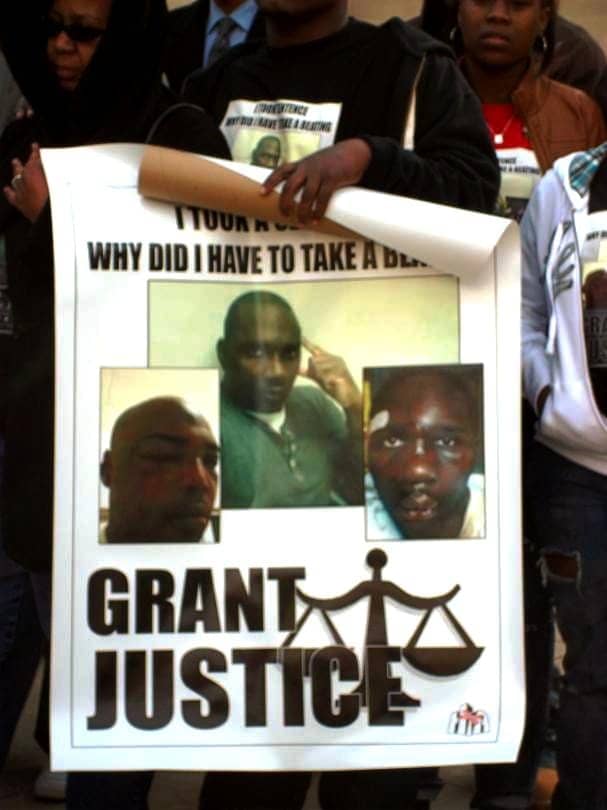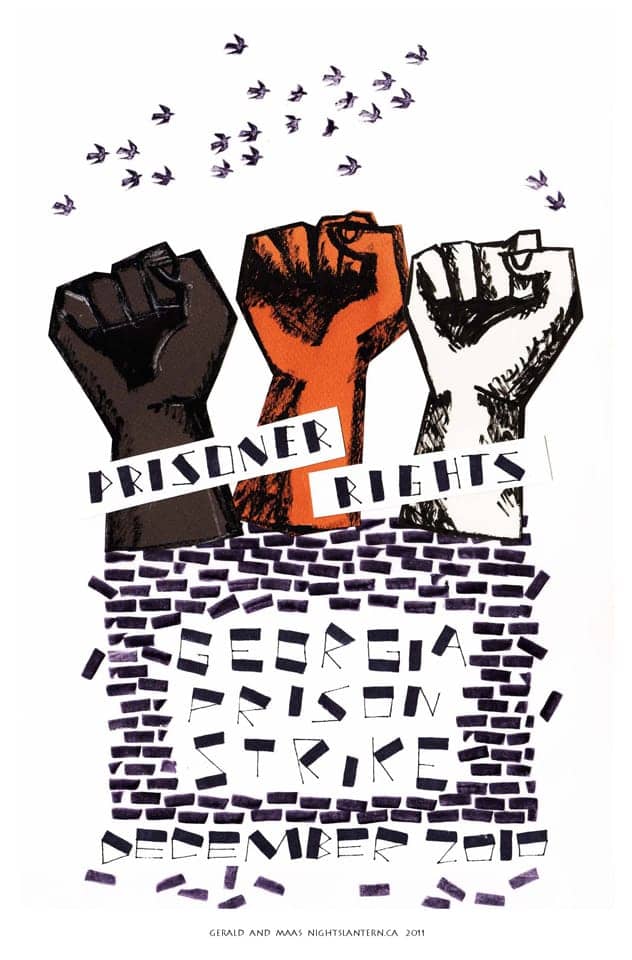Hunger strike underway since June 10 in Georgia
Powered by  Translate
Translate
Starving for change: Hunger strike underway since June 10 in Georgia’s Jackson State Prison
July 2, 201212
by Black Agenda Report managing editor Bruce A. Dixon
 This is the photo of Miguel Jackson after he was beaten with a hammer-like weapon. Guards suspected he was a leader of the mass sit-down strike in Georgia prisons on Dec. 9, 2010.
This is the photo of Miguel Jackson after he was beaten with a hammer-like weapon. Guards suspected he was a leader of the mass sit-down strike in Georgia prisons on Dec. 9, 2010.
Since June 10, according to accounts from prisoners and their families and Rev. Kenneth Glasgow of The Ordinary Peoples Society and the Prodigal Child Project, an undetermined number of prisoners at Georgia’s massive Diagnostic and Classification Prison near the city of Jackson have been on a hunger strike.
Back in December 2010, Black, Brown and white inmates in several Georgia prisons staged a peaceful protest, remaining in their dorms and cells rather than go to meals or work assignments. Their reasonable demands included wages for work, speedier and more transparent status reviews, decent food, real medical care, a more sane visitation policy and the availability of educational and vocational programs behind the walls.
State corrections officials responded with temporary cutoffs of heat, water and electricity in some buildings, along with an orgy of savage assaults and beatings across multiple institutions statewide. In one instance, corrections officials apparently conspired to conceal the whereabouts and condition of one prisoner who lingered near death in a coma for most of a week while they shuffled him hundreds of miles between prisons and hospitals.
State corrections say they rounded up 37 whom they believed were the strike leaders and put them under close confinement at Jackson, the same prison where Troy Davis was executed last year. Most of these prisoners have remained there in close confinement, with severely restricted access to visits, communication and their attorneys, and without medical attention for the past 18 months.
Some of these men are the Jackson State prison hunger strikers. After two weeks, according to the families of Miguel Jackson and Preston Whiting, they are weak from hunger and subject to fainting spells. But they seem to believe they have little to lose. They are, a letter from one of them asserts, “starving for change.” There were originally 10 of them, but some may have been transferred out, and some other prisoners joined the strike. We hope to have clearer information soon.
 This photo of a prisoner in Georgia lying on the cell floor in a pool of his own blood comes this week from a reliable source. More information about the circumstances has been requested and will be posted as soon as it comes in. The photo appears to have been taken by a cell phone camera, probably by a fellow prisoner. The foot and hand on the bottom and right side of the photo appear to be those of prisoners.
This photo of a prisoner in Georgia lying on the cell floor in a pool of his own blood comes this week from a reliable source. More information about the circumstances has been requested and will be posted as soon as it comes in. The photo appears to have been taken by a cell phone camera, probably by a fellow prisoner. The foot and hand on the bottom and right side of the photo appear to be those of prisoners.
They are demanding access to proper hygiene, medical treatment for their numerous and severe injuries, many of which were inflicted 18 months ago, the restoration of their visiting and communications rights and access to their meager personal property. They and their attorneys insist that the Georgia Department of Corrections follow its own published procedures requiring a status review of every inmate in punitive isolation every 30 days. They further insist that such evaluations be public and transparent so as to preclude the possibility of prejudicial conduct on the party of prison officials.
One of the strikers is Miguel Jackson, who was taken in handcuffs from his cell at Smith State Prison 18 months ago, removed to a secluded area out of range of the video cameras that monitor almost every inch of most Georgia prisons, and beaten with a hammer-like object. Jackson is one of several brutalized prisoners whose injuries have been untreated since.
Despite a blizzard of demands by his attorney, prison officials have refused Jackson and other prisoners medical attention for months. And although they have not eaten in two weeks, Jackson’s wife said, at the nine-day mark when medical necessity usually demands prisoners be removed to the infirmary, prison officials simply told Jackson, “You’re going to die,” and left it at that.
Some of these men are the Jackson State prison hunger strikers. After two weeks, according to the families of Miguel Jackson and Preston Whiting, they are weak from hunger and subject to fainting spells. But they seem to believe they have little to lose. They are, a letter from one of them asserts, “starving for change.”
“Most of civilized humanity regards extended solitary confinement as a crime,” said Rev. Kenneth Glasgow. “No less an establishment figure than Illinois Sen. Dick Durbin, D-Ill., convened an extraordinary public hearing on the subject less than a week ago. We are calling on the governor to ensure proper medical treatment for the hunger strikers, to restore their visitation and other rights and to end their punitive confinement without delay.
“We hope that people around the state and around the country will call the prison, the Department of Corrections and Georgia’s governor to express their concern for the well-being of the prisoners on hunger strike, and we further hope that they will join us on Monday, July 2, for a day-long fast in solidarity with the Georgia prisoners who are only insisting upon their dignity, their humanity, their legal and human rights.”
How you can help
We at BAR and the Georgia Green Party hope that you will take the time today and tomorrow to do four things:
1. Call, email and/or fax the numbers below. Politely convey your deep concern for the welfare of the prison hunger strikers at Georgia Diagnostic Prison, especially Mr. Jackson. We believe there are about 10 of them.
2. Sign the petition to Georgia’s governor demanding an end to the torture of solitary confinement and punitive isolation in its state prisons at http://endmassincarceration.org/content/sign-petition-stop-torture-georgia-prisons.
 A Georgia prisoner advocate at a Jan. 6, 2011, press conference holds a poster showing beaten prisoners. – Photo: Kristi E. Swartz, AJC.com
A Georgia prisoner advocate at a Jan. 6, 2011, press conference holds a poster showing beaten prisoners. – Photo: Kristi E. Swartz, AJC.com
3. Forward this article and the link to it to all your friends, family and co-workers and ask them to do the same. Send or carry a copy to your pastor and ask him to mention the fast on Sunday, and invite him to fast that day as well.
4. Participate in the July 2 solidarity fast with Georgia’s prisoners who are standing up for their human rights across lines of race and religion. The prisoners, like the rest of us, are Black, Brown and white and of varying religious beliefs.
We demand justice for Miguel and the hunger strikers
by Delma Jackson, wife of Miguel Jackson
In January 1994, the “Georgia General Assembly passed Senate Bill 440, which gives the Superior/Adult Court exclusive jurisdiction over youth ages 13 to 17 who have been arrested for one of seven violent offenses, otherwise known as the “Seven Deadly Sins.” These crimes include murder, rape, armed robbery (with a firearm), aggravated child molestation, aggravated sodomy, aggravated sexual battery and voluntary manslaughter,” according to Wiki.answers.com.
In 1995 Miguel was convicted of armed robbery; it was his first offense, and he waived his right to a jury trial. He was convicted and sentenced by Judge William Daniel under the Georgia Seven Deadly Sins law. Judge Daniel was unfamiliar with the new law and he somehow thought that Miguel would be eligible for parole after 10 years. The Seven Deadly Sins law states that parole is not an option. Judge Daniel passed away two years after he sentenced Miguel, and we have been unable to get his sentenced corrected.
The day that shook our world
On Dec. 31, 2010, Miguel was handcuffed and beaten by correctional officers at Smith State Prison. He was taken to the hospital and treated for his injuries. That night they took Miguel back to Smith State Prison. The following morning someone took pictures of Miguel and sent them to his mother and I. We immediately drove to Smith State Prison and attempted to visit with Miguel because it was our visitation day. The prison authorities refused to allow us to visit with him despite our deep concerns for Miguel’s safety.
 This drawing commemorates the Georgia Prison Strike of 2010, emphasizing that, like all the prison strikes since then, it was multi-racial. Race is used to divide and conquer prisoners in every prison system in the U.S., and prisoners gain power by resisting that scheme and uniting across racial lines.
This drawing commemorates the Georgia Prison Strike of 2010, emphasizing that, like all the prison strikes since then, it was multi-racial. Race is used to divide and conquer prisoners in every prison system in the U.S., and prisoners gain power by resisting that scheme and uniting across racial lines.
They told us that Miguel was OK and nothing had happened to him. Unbeknownst to them, we had pictures that said otherwise. We asked them to just let us see him to give us peace of mind and they refused. They advised us that Warden Donnie Thompson had given them orders that if we did not leave, they would call the police and have us arrested.
Needless to say, we left and headed back to Atlanta to find help for Miguel. We contacted Channel 11 News and they got us in contact with the NAACP. We retained our attorney, Mario Williams, on Monday Jan. 3, 2011. The following day he went to visit with Miguel, and Warden Donnie Thompson refused to let him speak with his client.
Mr. Williams left and spoke with the Superior Court judge of Tattnall County. He showed the judge the pictures of Miguel, and the judge called the prison and instructed Warden Thompson to allow Mr. Williams to see his client. Mr. Williams returned to the prison and Warden Thompson would not let him see Miguel.
The head attorney for the Georgia Department of Corrections contacted Warden Thompson and instructed him to allow Mr. Williams to see Miguel and the warden still refused. Mr. Williams was informed that they would make a way for him to see his client and assured him that Miguel would be moved immediately. He also advised Mr. Williams that he would be able to visit Miguel the following day at the new institution. Miguel was transferred to GDCP in Jackson, Georgia, where he has been since Jan. 4, 2011.
Miguel suffers daily for the injuries he sustained at Smith State Prison. He has chronic migraine headaches, a broken nose, and he suffers from post-traumatic syndrome. He still has the hammer indentations in his head. He has been complaining about the headaches and has been told that he would be seeing a neurologist, which still hasn’t happened.
The medication he was recently given for his headaches is actually Neurontin. Neurontin (gabapentin) is an anti-epileptic medication, also called an anticonvulsant. It affects chemicals and nerves in the body that are involved in the cause of seizures and some types of pain. Neurontin is also used in adults to treat nerve pain caused by herpes virus or shingles (herpes zoster). Why would they give him Neurontin medicine when he is complaining of severe headaches and pain in his knees?
On Sunday, June 11, nine inmates along with Miguel declared a hunger strike, stating that they “are starving for change.”
 In response to the 2010 Georgia prison strike, several solidarity actions were held around the country. Here, protesters from the Concerned Coalition to Respect Prisoners’ Rights and All of Us or None of Us rally at the Mound Road prison in Detroit on Dec. 14, 2010.
In response to the 2010 Georgia prison strike, several solidarity actions were held around the country. Here, protesters from the Concerned Coalition to Respect Prisoners’ Rights and All of Us or None of Us rally at the Mound Road prison in Detroit on Dec. 14, 2010.
The failure to treat Miguel for the injuries he sustained at the hands of the Georgia Department of Corrections (GDOC) officers has caused extreme stress and worry for the our family. The GDOC don’t even follow their own Standard Operating Procedure (SOP), examples below:
- Ref# II0090001 Section N-8: Inmates shall be assigned all of his or her property consistent with the length of assignment and security need of the unit. (Inmates are not given their property.)
- Section N-5: Visitation shall be the same as the general population. (General population has open visitation; Miguel’s visits are behind a glass.)
- Section N-10: Inmates may order items from the commissary. Items for the commissary may be withheld if determined by the Correctional Supervisor to be a threat to the security of the Administrative Segregation Unit.
- Exercise shall be available five hours per week, one hour per day. (This is not happening: there is a shortage of guards, so inmates are not given time to exercise.)
Miguel has been held in maximum security for 18 months. He is being punished for officers beating him, and the officers are going on with their lives as if nothing happened. Where is the justice in that?
Urgent action needed!
We must demand justice for Miguel Jackson and other Georgia state prisoners who are being targeted and brutalized for exposing their inhumane conditions and standing up for their most basic human rights.
 On Dec. 17, 2010, eight days after the strike, Oaklanders rallied and marched through a driving rainstorm – Jabari Shaw in the lead – in solidarity with the striking prisoners in Georgia. – Photo: Malaika Kambon
On Dec. 17, 2010, eight days after the strike, Oaklanders rallied and marched through a driving rainstorm – Jabari Shaw in the lead – in solidarity with the striking prisoners in Georgia. – Photo: Malaika Kambon
Pastor Glasgow is organizing a solidarity fasting for the hunger strike inmates, including Miguel Jackson, and against the inhumane torturous acts of Georgia prison officials. He’s hosting a rally at the Georgia State Capitol in Atlanta on Friday, June 29, 2012, from 12-2 p.m. Pastor Glasgow is calling on all to come and stand with him and other groups for Miguel Jackson and all inmates being treated wrongly throughout the country.
Please immediately make phone calls and send emails and/or letters to Department of Corrections Commissioner Brian Owens, as well as Georgia Gov. Nathan Deal (contact info listed below). Also, help spread the word by re-posting this solidarity appeal on blogs, email lists, social media etc. If you are part of an organization, send letters and make calls in the name of your group.
Please send copies of protest letters to nysocialists@hotmail.com. For more information, contact Socialist Alternative at (206) 526-7185 or info@socialistalternative.org.
We must demand justice for Miguel Jackson and other Georgia state prisoners who are being targeted and brutalized for exposing their inhumane conditions and standing up for their most basic human rights.
Register your protest and support for the 10 GDCP hunger strikers and demand justice by contacting:
- Georgia Diagnostic and Classification Prison, Hwy 36 West, P.O. Box 3877, Jackson GA 30233, phone (770) 504-2000, fax (770) 504-2006
- Georgia Department of Corrections Commissioner Brian Owens, at
- (478) 992-5258 (This is the number for Owens’ administrative assistant, Peggy Chapman. Urge her to give him the message.)
- (478) 992-5367 (This is the Office of the Ombudsman, which is the official channel for raising concerns over prisoner treatment)
- Georgia Gov. Nathan Deal, at (404) 656-1776, by fax at (404) 657-7332, online at http://gov.georgia.gov/00/gov/contact_us/0,2657,165937316_166563415,00.html or by mail to Office of the Gov. Nathan Deal, State of Georgia, 203 State Capitol, Atlanta, GA 30334.

